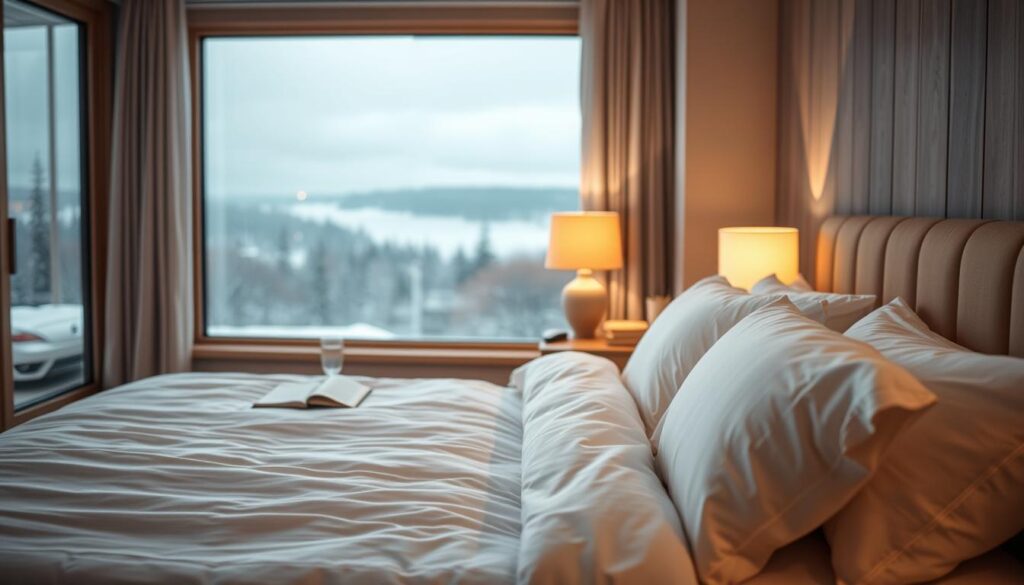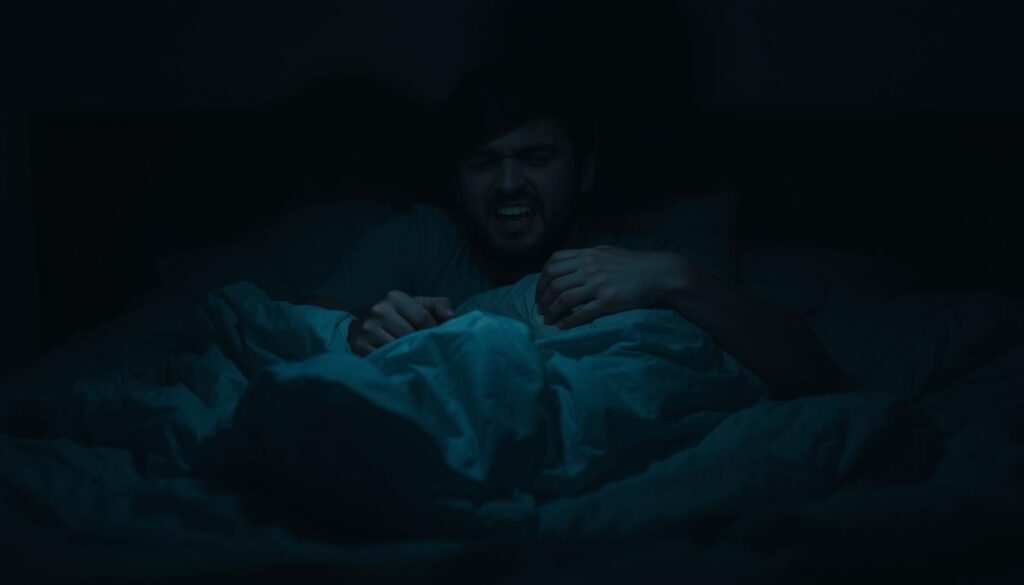Get Better Sleep: Solutions A good night’s sleep is essential for your health and happiness. But many things can disrupt quality sleep. This includes work stress, family duties, and being sick.
The Mayo Clinic says that good sleep habits can solve sleep problems. By knowing how sleep matters and using smart strategies, you can improve the quality of your sleep.
It’s important to try different ways to solve sleep issues. This article will give you useful tips for a peaceful night’s sleep.
Key Takeaways
- Understand the factors that affect sleep quality
- Learn effective strategies for improving sleep
- Discover habits that promote better rest
- Explore approaches to alleviate sleep issues
- Implement practical solutions for a restful night’s sleep
The Impact of Sleep on Your Health and Well-being
Sleep quality affects many health areas, like physical, mental, and emotional wellbeing. Getting enough sleep is key for staying healthy. Its effects are wide-ranging.
How Sleep Affects Physical Health
Sleep is vital for physical health. It helps the body fix and grow back damaged cells and tissues. It also boosts the immune system. Not getting enough sleep can lead to serious health issues like obesity and heart disease.
Physical Health Benefits of Quality Sleep:
- Enhanced immune function
- Improved glucose regulation
- Reduced inflammation
- Better cardiovascular health
Mental and Emotional Benefits of Quality Sleep
Quality sleep is also crucial for mental and emotional health. It improves focus, memory, and problem-solving skills. It also helps manage emotions, lowering the chance of depression and anxiety.
The mental and emotional benefits of quality sleep include:
- Improved mood stability
- Enhanced cognitive function
- Better stress management
- Reduced risk of mental health disorders
The Consequences of Chronic Sleep Deprivation
Long-term sleep loss can harm health a lot. It makes thinking, judgment, and mood worse. It also raises the chance of getting chronic diseases like heart disease and diabetes.
| Health Risks | Consequences of Chronic Sleep Deprivation |
|---|---|
| Cardiovascular Disease | Increased risk due to heightened inflammation and stress |
| Mental Health Disorders | Higher risk of depression, anxiety, and mood swings |
| Metabolic Disorders | Increased risk of obesity and type 2 diabetes |
To get better sleep, understanding how sleep affects health is key. By following sleep tips and keeping a regular sleep schedule, you can greatly improve your wellbeing.

Understanding Common Sleep Problems
Knowing about common sleep issues is key to better sleep. Sleep disorders can really affect our mood, work, and health.
There are many sleep disorders to be aware of. These include insomnia, sleep apnea, and restless leg syndrome. Each has its own causes and signs.
Insomnia and Its Various Forms
Insomnia makes it hard to fall or stay asleep, even when you have the chance. It can be short-term or long-term. It often comes from stress, anxiety, or irregular sleep times. Managing insomnia well means setting a regular sleep schedule, making your sleep area comfy, and trying relaxation methods.
Some people get short-term insomnia from big life events or stress. Others have chronic insomnia that lasts longer. Knowing why you have it helps find the right treatment.
Sleep Apnea and Breathing-Related Issues
Sleep apnea means you stop breathing or breathe shallowly during sleep too often. It breaks up your sleep and can lower oxygen levels. This can make you tired during the day and cause other health problems. Treatment for sleep apnea includes changing your lifestyle, using oral devices, and CPAP therapy.

Restless Leg Syndrome and Movement Disorders
Restless Leg Syndrome (RLS) is a brain disorder that makes you feel like you must move your legs. It’s often uncomfortable. It can really mess up your sleep. Dealing with RLS often means making lifestyle changes, like exercising regularly, avoiding caffeine, and sleeping well. Sometimes, doctors might prescribe medicine to help.
By learning about these common sleep issues, you can start working on natural remedies for better sleep. This can help improve your sleep quality.
The Science Behind Sleep Cycles
Understanding sleep cycles is key to finding sleep solutions that work. Sleep cycles have many stages, each important for our sleep quality and health.
REM and Non-REM Sleep Stages
Sleep is not just one state but a dynamic process with different stages. These are mainly REM (Rapid Eye Movement) and non-REM sleep. Non-REM sleep has three stages: N1, N2, and N3, with N3 being the deepest.
- Stage N1 (Transition to Sleep): This stage is when we start to fall asleep, with brain waves slowing down.
- Stage N2 (Light Sleep): Here, our body temperature drops, and our heart rate slows, getting ready for deeper sleep.
- Stage N3 (Deep Sleep): Known as slow-wave sleep, it’s key for physical recovery, immune function, and memory.
- REM Sleep: This stage is marked by fast eye movements and vivid dreams. It’s important for learning and memory.
A full sleep cycle lasts about 90-120 minutes. Most people go through 3-5 cycles each night. The mix of REM and non-REM sleep changes, with more deep sleep early and more REM later.
Age-Related Changes in Sleep Requirements
Sleep needs and patterns change with age. Babies need a lot of sleep, especially REM sleep, for growth. As we get older, our sleep becomes lighter and less restorative, with more waking up.
“Sleep is a complex, multifaceted process that evolves over a lifetime, influenced by a myriad of factors including age, lifestyle, and health conditions.”
Knowing these changes helps us find sleep solutions that work for all ages and tackle sleep issues related to age.
Creating the Optimal Sleep Environment
Creating a great sleep environment involves several key factors. These can greatly improve your sleep quality. A well-designed bedroom can become a sanctuary for restful sleep and rejuvenation.
Bedroom Temperature and Ventilation
Keeping your bedroom at the right temperature is key for sleep. Studies show that a cooler bedroom, around 60-67 degrees Fahrenheit, is best for sleep. Also, good ventilation is important to prevent carbon dioxide buildup and keep the air fresh.
Use a fan or adjust your thermostat to get the perfect temperature. Good airflow also helps regulate your body’s temperature, leading to deeper sleep.
Light Management and Blackout Solutions
Light exposure greatly affects your sleep-wake cycle. Darkness triggers melatonin production, the sleep hormone. To manage light, use blackout curtains or shades to block out external light.
If you can’t darken your room, a sleep mask is a good alternative. Also, turn off electronic devices that emit light, like smartphones and TVs, at least an hour before bed.
Noise Control Strategies
Noise is another big factor that can disrupt sleep. To make your sleep environment quieter, use earplugs or a white noise machine. White noise machines can mask background noises with a constant, soothing sound, helping you fall asleep easier.
Soundproofing your bedroom or using noise-reducing curtains can also help reduce external noise.
Selecting the Right Mattress and Bedding
The right mattress and bedding are crucial for sleep quality. A mattress that supports your body correctly can help with back pain and improve sleep posture.
When picking bedding, think about the material and thread count. Breathable fabrics like cotton help regulate body temperature. A comfortable thread count can also make your sleep better.
By focusing on temperature, light, noise, and bedding, you can make a sleep-friendly environment. This holistic approach to sleep environment optimization can improve your sleep quality and overall well-being.
Establishing a Sleep-Promoting Routine
A sleep-promoting routine is key to a good night’s sleep. It includes practices and rituals that boost quality sleep techniques. This part talks about the main parts of a sleep routine, like keeping a regular sleep schedule and bedtime rituals. It also covers how to handle sleep issues on weekends or when traveling.
Consistent Sleep-Wake Schedules
Keeping a regular sleep schedule is crucial. It helps your body’s internal clock work better. The Mayo Clinic says going to bed and waking up at the same time every day, even on weekends, improves sleep quality.
| Benefits | Impact on Sleep |
|---|---|
| Regulates the Body’s Internal Clock | Improves sleep timing and quality |
| Enhances Sleep Hygiene | Promotes a consistent sleep schedule |
| Increases Alertness | Boosts energy levels and daytime functioning |
Effective Bedtime Rituals
Creating good bedtime rituals is important. These can be things like reading, meditation, or a warm bath. The goal is to find calming activities that help you relax and get ready for sleep.
“A calming pre-sleep routine can help signal to your brain that it’s time to wind down, making it easier to fall asleep.”
Some good bedtime rituals include:
- Reading a book
- Practicing gentle stretches or yoga
- Listening to soothing music
- Meditation or deep breathing exercises
Managing Weekend and Travel Sleep Disruptions
It’s important to handle sleep issues on weekends or when traveling. Try to adjust your sleep times a few days before traveling to a new time zone. Also, make sure your sleep environment is comfortable, even in a new place.
- Stick to your regular sleep schedule as much as possible.
- Adjust your sleep schedule a few days before traveling to a new time zone.
- Create a sleep-friendly environment, even in a new location.
Nutrition’s Role in Sleep Quality
Sleep quality is closely linked to what we eat. The food we choose can either help or hurt our sleep. Knowing which foods affect sleep can guide us to better rest.
Sleep-Enhancing Foods and Nutrients
Certain foods and nutrients can help us sleep better. These include:
- Tryptophan-rich foods like turkey, chicken, and fish, which help produce serotonin and melatonin.
- Complex carbohydrates such as whole grains, which increase serotonin levels.
- Calcium found in dairy products and leafy greens, which helps relax the body.
- Magnesium-rich foods like dark chocolate, nuts, and seeds, which can reduce stress and promote relaxation.
Foods and Beverages to Avoid Before Bed
Some foods can disrupt sleep, while others can help. It’s best to avoid:
- Caffeine found in coffee, tea, and chocolate, as it can interfere with sleep.
- Alcohol, which can disrupt sleep patterns despite its initial sedative effects.
- Heavy meals close to bedtime, as they can cause discomfort and indigestion.
- Spicy foods that can lead to heartburn and discomfort.
Staying away from these foods before bed can lead to better sleep.
Timing Your Meals for Better Sleep
When we eat can also affect our sleep. Eating a big meal too close to bedtime can be bad. But going to bed hungry is not good either.
| Meal Timing | Impact on Sleep |
|---|---|
| Eating a heavy meal before bed | Can cause discomfort and indigestion |
| Going to bed on an empty stomach | Can cause hunger pangs and discomfort |
| Having a balanced dinner 2-3 hours before bed | Can promote better sleep quality |
Getting the timing right for our meals can greatly improve our sleep.
Find ways to Improve Sleep Through Physical Activity
Physical activity is a natural and effective sleep solution that can significantly enhance the quality of your rest.
Regular exercise improves physical health and has a big impact on sleep patterns. It helps you understand how exercise affects sleep, leading to better rest.
Influence of Exercise on Sleep Architecture
Exercise changes sleep stages, including REM and non-REM sleep. It increases deep sleep and improves sleep continuity.
A study showed that exercise boosts slow-wave sleep. This is key for physical recovery and rejuvenation.
Best Types of Exercise for Sleep Improvement
Not all exercises are the same for sleep improvement. Aerobic exercises, like walking and cycling, are especially good.
Resistance training and yoga also help. They reduce stress and improve comfort, leading to better sleep.
| Type of Exercise | Impact on Sleep |
|---|---|
| Aerobic Exercise | Improves sleep quality and duration |
| Resistance Training | Enhances deep sleep and reduces sleep fragmentation |
| Yoga | Reduces stress and promotes relaxation before bed |
Optimal Timing for Sleep-Enhancing Workouts
When you exercise is key for sleep benefits. Exercising too close to bedtime can disrupt sleep.
It’s best to finish workouts a few hours before bed. This lets your body relax.
By adding physical activity to your day and choosing the right time and type, you can use exercise as an effective sleep solution. This will improve your sleep quality.
Natural and Holistic Approaches to Sleep Enhancement
Natural and holistic methods can greatly improve sleep quality and overall health. As people look to better their sleep, exploring different therapies can offer valuable insights and relief.
Herbal Supplements and Their Effectiveness
Herbal supplements have been used for centuries to help people relax and sleep better. Valerian root and chamomile are top choices for their calming effects. Studies show these supplements can cut down on time it takes to fall asleep and enhance sleep quality.
A study on valerian root found it greatly improved sleep in those with insomnia. Chamomile tea also helps relax and can reduce anxiety that disrupts sleep.
Aromatherapy and Essential Oils for Relaxation
Aromatherapy uses plant-based essential oils to promote relaxation and well-being. Oils like lavender and bergamot positively affect sleep. Lavender oil, in particular, helps reduce anxiety and improve sleep.
A study showed inhaling lavender oil before bed greatly improved sleep in insomnia patients. This makes aromatherapy a good addition to bedtime routines for better sleep.
Acupuncture and Traditional Medicine Approaches
Acupuncture, a traditional Chinese medicine, involves inserting fine needles into specific body points. It aims to restore balance and promote healing. Research indicates acupuncture can improve sleep by regulating the body’s internal clock and reducing stress.
A systematic review found that acupuncture significantly improved sleep in those with insomnia. This suggests acupuncture could be a helpful treatment for sleep disorders.
Meditation and Mindfulness Practices
Meditation and mindfulness are popular for reducing stress and promoting relaxation. These practices focus the mind and increase awareness of the present moment. Regular practice can improve sleep by lowering anxiety and promoting calm.
“Meditation is not a way of escaping the world; it is a way of learning how to live in it with greater clarity and compassion.”
Studies show mindfulness-based stress reduction programs can significantly improve sleep quality. By adding mindfulness to daily routines, people can better manage stress and enhance their sleep.
Managing Stress and Anxiety for Better Sleep
Reducing stress and anxiety can greatly improve sleep quality. Stress triggers a fight-or-flight response, releasing hormones like cortisol and adrenaline. These hormones can make it hard to fall asleep and lower sleep quality.
To manage stress and anxiety, it’s key to calm the mind and body before sleep. Some effective strategies include:
- Cognitive Behavioral Techniques: These help manage racing thoughts and worries that come with stress and anxiety.
- Progressive Relaxation and Body Scanning: These techniques relax the body and calm the mind.
- Journaling: Writing down worries and thoughts before bed can clear the mind.
Cognitive Behavioral Techniques for Racing Thoughts
Cognitive Behavioral Therapy (CBT) is a helpful approach in managing stress and anxiety. It changes negative thought patterns. Techniques like cognitive restructuring and thought stopping are very effective.
Cognitive restructuring involves identifying and replacing negative thoughts with balanced ones. This can reduce anxiety and help you fall asleep easier.
Progressive Relaxation and Body Scanning
Progressive relaxation involves tensing and relaxing different muscle groups to release tension. Body scanning focuses on different body parts, starting from toes to head, to release tension.
These techniques can be practiced together for better relaxation. For example, tense your toes, hold for a few seconds, and then release. Move up through the body, tensing and relaxing each muscle group in turn.
Journaling to Release Worries Before Bed
Journaling is a simple yet effective way to clear your mind before sleep. By writing down your thoughts and worries, you can process your emotions and let go of the day’s stress.
To make journaling a sleep-promoting habit, consider these tips:
- Keep a journal beside your bed.
- Write down your thoughts and feelings without editing.
- Reflect on positive experiences or things you’re grateful for.
By incorporating these techniques into your daily routine, you can better manage stress and anxiety. This leads to improved sleep quality.
Technology’s Impact on Sleep Quality
Technology’s effect on sleep is both good and bad. It’s key to know how it changes our sleep to find better sleep strategies.
Blue Light Exposure and Melatonin Production
Blue light from devices like phones and computers can mess with our sleep. It stops our body from making melatonin, a hormone that helps us sleep. This makes it tough to fall asleep at night.
To fight this, try blue light glasses or apps. Some devices have settings that lower blue light in the evening.
Digital Boundaries for Better Sleep
Creating digital limits is important for better sleep. Make sure to have device-free times and places, like during meals or in bedrooms. Not using screens an hour before bed can really help.
- Set device-free zones in your home.
- Use apps that track and limit screen time.
- Establish a pre-bedtime routine that doesn’t involve screens.
Helpful Sleep Apps and Tracking Devices
Technology can also help with sleep. Sleep apps and devices track our sleep, giving us tips to sleep better.
- Sleep tracking apps that monitor sleep stages.
- Smart alarms that wake you during a light sleep phase.
- Guided meditation and relaxation apps.
By understanding tech’s impact on sleep and using it wisely, we can improve our sleep. This way, we can enjoy tech without losing sleep.
Conclusion: Your Personalized Path to Better Sleep
Understanding sleep’s complexities can lead to better sleep and health. To improve sleep, create a good sleep space, follow a sleep routine, and use nutrition and exercise. These steps help a lot.
Looking into different sleep techniques can help you find what works for you. This includes managing stress, using natural methods, and setting limits on digital use. You might also try herbal supplements, mindfulness, or sleep-tracking devices.
Starting your journey to better sleep is exciting. It’s about finding the right approach for you. By using these tips and paying attention to your sleep, you can get the rest you need. This will boost your health and wellbeing.
FAQ
What are some effective ways to improve sleep quality?
Setting a regular sleep schedule is key. Make your bedroom a sleep haven. Stay away from exciting activities at night. Try relaxation methods like meditation to calm down before bed.
How does nutrition impact sleep, and what foods can enhance it?
What you eat affects how well you sleep. Eating foods that boost melatonin and serotonin can help. Avoid big meals before bed. Foods like tart cherries, walnuts, and oatmeal are good for sleep.
Can physical activity really improve sleep, and what types are most effective?
Yes, exercise can help you sleep better. It reduces stress and helps your body relax. Walking, cycling, yoga, and tai chi are great for sleep.
How can stress and anxiety be managed to improve sleep?
Manage stress with therapy, relaxation, and meditation. Writing down your worries before bed can also help. It clears your mind and relaxes you.
What role does technology play in sleep quality, and how can it be managed?
Technology affects sleep in different ways. Blue light from screens can disrupt sleep, but sleep apps can help. Set digital limits to avoid screens before bed.
Are natural and holistic approaches effective in improving sleep?
Natural methods like herbal supplements and aromatherapy can help. But talk to a doctor before trying new things. They can ensure safety.
How can I create an optimal sleep environment?
For a good sleep space, control temperature, light, noise, and bedding. Keep it cool, dark, and quiet. A comfy mattress and pillows are also important.
What are some effective sleep improvement tips for busy professionals?
Busy people should stick to a sleep schedule and avoid exciting activities at night. Relaxation techniques and a good sleep environment are also key. Pay attention to what you eat and exercise too.
Can sleep solutions be personalized to individual needs?
Yes, sleep plans can be made just for you. Think about your lifestyle, sleep issues, and what you like. Try different things to find what works best.









